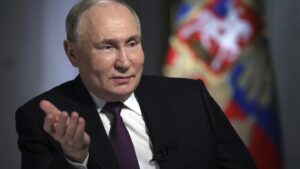Putin’s Nuclear Proposals: Impacts on NATO Security
Russian President Vladimir Putin has recently reconsidered the provisions of Russia’s nuclear doctrine, announcing what seem to be changes of a more aggressive nature that reflect a lower threshold for the actual usage of nuclear weapons. This announcement is made in the latitudes of the enduring hostility that has been experienced in the region of Ukraine, to lessen the Western assistance that is being offered to military operations in Ukraine.
Key Changes in Nuclear Doctrine
Many of these changes show that Russia might resort to nuclear weapons even in the case of aggression from a non-nuclear country, which has, however, a nuclear ally. Such an attack, he said, would constitute a “Combined Attack” on Russia, thus embracing a changed doctrine. The former, still objections entirely focused on the necessity of using nuclear weapons contained in doctrine, allowed such weapons to be used only when the threat to state existence was direct and particularly where liquidation of the existing armed forces had to be answered with a nuclear strike.
Specific Conditions for Nuclear Engagement
The new rules outlined by Putin include:
Response to Conventional Attacks: Russia states that it may engage in nuclear warfare as a retaliatory response unless a conventional attack that poses a “critical threat” to the country’s integrity is launched first.
Joint Assault Recognition: There will be no such country as a non-nuclear aggressor against Russia, so any such aggression, especially one that is assisted by a nuclear state, shall be deemed a ‘joint aggression’ hence necessitating a nuclear response.
Detection of Aerial Attacks: The doctrine outlines and states that valid information about the possibility of a significant aerial attack, including missiles and other forms of launch, such as drones, shall lead to nuclear deliberations reaching engagement levels.
Strategic Implications
The modifications, according to analysts, are meant to send a warning to the Western countries and to prevent them from allowing Ukraine to target the Russians in the east with long-range missiles. The announcement by Putin bears resemblance to the time when President of Ukraine Volodymyr Zelenskyy was in the US seeking military assistance that included arms. Here, the analysts argue, is an example of Putin trying to change the game, as, even in the context of actions carried out with the support of the West, conventional military operations could adequately be met by Moscow.
Why Meta Celebrity Approach to AI is a Game Changer
Broader Context
These developments are taking place against the background of the ongoing discussions among the Western allies about increasing assistance to Ukraine in military terms. As Ukraine seeks to increase its offensive capabilities to include long-range missiles, for instance, Putin’s statements seem to be aimed at reaffirming the importance of nuclear deterrence as a central pillar of Russian defense.
To summarize, the conditions under which Putin suggests the use of nuclear weapons have changed dramatically, just like the use of a strategy and a war of words, in light of prevailing circumstances.
To get more information about this article visit BBC or click on this line
Get the Most Important Updates about the World!

1 thought on “Putin’s Nuclear Proposals: Impacts on NATO Security”